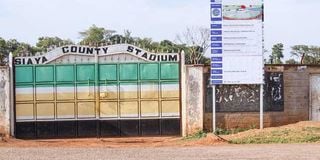
The gate to the Siaya County Stadium in this August 2019 photo. According to the Auditor-General, the cost of construction has ballooned from Sh394.6 million to Sh488.7 million.
Marsabit County resorted to restricted tendering to award a contract for the purchase of a school bus in a record six days.
The county executive invited only one bidder who was not in its list of registered suppliers, contrary to the Public Procurement and Asset Disposal Regulations, 2020.
According to the law, where restricted tendering is used, the procuring entity shall invite tenders from all the known suppliers of the goods, works or services.
But after locking out other suppliers, Marsabit County officials rushed the procurement process to close the deal for their preferred supplier.
The tender opening, evaluation and notification to the successful tenderer were done on May 19, May 22 and May 24, 2023, respectively.
And the local purchase order was issued on June 19, 2023, paving the way for the lucky motor vehicle dealer to be paid Sh13.7 million for delivery of a semi-luxury 62-seater school bus.
This wasn’t the only preferential treatment the supplier got. Tender specifications were waived to apparently facilitate delivery of the bus of their choice.
The technical specifications for the required bus were a Fuso FJX4 engine capacity 6370 CC. But the delivered bus was a FUSO FJ1623R of engine capacity of 7500 CC.
“The bus was not subjected to an inspection and acceptance committee report or post-delivery inspection report from the relevant technical department of either the national or the county government. In the circumstances, management was in breach of the law,” states a report of the Auditor-General on the county governments for the 2022/2023 financial year.
The audit reports for the year ended June 30, 2023, expose how rules are routinely bent by county officials to hand lucrative tenders to preferred merchants.
These audits detail how public procurement is riddled with irregularities that ultimately leave the taxpayers incurring heavy losses in inflated prices and huge payments for shoddy or no work done.
Spread out across the country are white elephants that have cost taxpayers billions, painful relics of what should have been a ticket to better services in new hospitals, roads, markets, stadiums and schools.
In another illustration of the questionable procurement dealings, contractors who are supposed to be blacklisted for failing to complete previous projects despite being paid continue to bag new lucrative tenders in the same counties.
This is the case in Nairobi where a contractor was hired to construct three health facilities for Sh869 million.
The projects were for the construction and equipping of Pumwani Lucky Summer dispensary, Pumwani Majengo Health Centre and Gumba/Mabatini dispensary. The contract had been awarded during the 2020/21 financial year.
However, a physical inspection of the projects by auditors on September 28 and 29, 2023, revealed they were not completed. The construction of Lucky Summer dispensary had barely started.
But despite the failure to complete these projects, the same contractor was awarded another contract for construction works at Mama Lucy Kibaki hospital for Sh344 million.

Mama Lucy Kibaki Hospital in Nairobi on December 22, 2020.
And in yet another sweetener for the contractor, the accounting officer on March 12, 2021 had approved use of restricted tendering which essentially whittled down competition for the tender.
The county management did not demonstrate how the construction works were of specialised nature or the time and cost required to evaluate bidders would be disproportionate to the contract price to warrant restricted tendering.
By the time of audit in November last year, the contractor had been paid Sh165 million and the project had stalled.
Missing documents
In Trans Nzoia, auditors were not convinced that procurement documents for the Sh657.3 million modernisation of Kenyatta Stadium in Kitale were missing because the documents had been submitted to the Directorate of Criminal Investigations.
The contractor has already pocketed Sh143 million for the contract which was awarded on January 31, 2023.

Part of the terraces at Kenyatta Stadium in Kitale town on February 22, 2023, before a ground-breaking ceremony for the construction of a new stadium by Governor George Natembeya on February 27, 2023.
Without the requisite documents, the report says it is not possible to confirm if the contract was awarded in accordance with the law and if the public obtained value in the contract award.
Another procurement irregularity flagged is payments for goods never delivered.
Auditors, for instance, questioned payments totalling Sh80 million by Kiambu county government for undelivered goods.
The audit cites a local purchase order issued on March 15, 2023 for delivery of 60,000 one-month old chicks, but only 22,500 chicks had been delivered by August last year.
According to the report, no explanation was provided as to why the supplier did not supply the remaining 37,500 chicks.
However, it adds the total contract price of Sh18 million was fully paid on March 23, 2023.
The county had also paid a state agency Sh16.5 million for supply of 13,063 bags of coffee fertiliser which were never delivered.
In 2020, the county spent Sh11.2 million to procure semen, liquid nitrogen, plastic socks, hand gloves and paper towels from Kenya Animal Genetic Resources Centre.
However, only goods worth Sh5.4 million were supplied leaving a balance of Sh5.7 million.
Tana River County also paid Sh27 million for the supply of six tractors that were neither received nor recorded in the fixed assets register.
In addition, no logbooks were provided to confirm ownership of the tractors and there was no evidence showing that due process was followed in awarding the contract, the report states.
It would later emerge that four out of the six tractors were at the Ministry of Lands yard. The four tractors have not been used since May 2023.
This raises the question of the purchase of expensive items that are never put to use suggesting there was no need for their procurement in the first place.
For instance, the report questions the wisdom of West Pokot procuring its own rig and truck from a supplier for Sh41.8 million yet continues to award contracts for borehole drilling services to private companies.
Although the county has two fully functional drilling rigs, last year it spent Sh56.4 million on 25 private companies. “No justification or explanation was provided for awarding the contracts while the drilling rigs were fully operational,” the audit states.
Even more intriguing is that a cost-benefit analysis indicated the county spent Sh37 million when it deployed the rigs to drill 19 boreholes at an estimated cost of Sh1.9 million for each borehole.
“Comparatively, the cost matched closely the amount incurred for drilling a borehole using private contractors and therefore the county executive was not benefiting from owning the rigs. In the circumstances, value for money may not have been achieved from owning and using the drilling machines,” the report notes.
That is also the fate of the Sh172 million fresh produce market at Emali Town in Makueni. An inspection of the project on August 22, 2023 revealed it was complete but not in use.
Construction of official residences for governors and their deputies has become another cash cow for counties.
Although the Salaries and Remuneration Commission capped the price at Sh45 million, the projects are costing taxpayers far much more.
Most have stalled despite gobbling up hundreds of millions and the county leaders continue drawing hefty house allowances, a double loss for taxpayers.
Construction terminated
Construction of the Turkana governor’s one-storey residential house was terminated in the 2014/2015 financial year after the contractor had pocketed Sh120 million.
A new Sh90.5 million contract was awarded on April 24, 2019. The house was supposed to be completed by October 2021, but an inspection of the project on November 14, 2023 revealed it had stalled as the contractor was not on site.
In Bomet, construction of the governor’s Sh78 million residence was to be completed in 2021. An inspection of the project in August 2023 revealed it was incomplete 26 months after the estimated completion date and the contractor was not on site.
Further, roofing timber valued at Sh3.4 million was rotting away as it had not been covered with iron sheets “which may be condemned resulting to ineligible increase of the contract cost.” As at June 30, 2023, Sh48.5 million or 62 per cent of the contract sum had been incurred with 51 per cent of the work done.
In Samburu, the governor’s residence is being constructed for Sh87.5 million. As at August 17, 2023, Sh60.4 million had been paid and the project is incomplete long after the deadline.
The Sh97.7 million deputy governor’s residence is finally complete in Mandera but it’s still vacant.
A final payment of Sh10.7 million was done during the year under review for the construction that began in April 2019.
Nandi county also terminated the contract for construction of the county boss’s residence although the contractor was paid Sh10 million during the year under review.
The county entered into a second contract in September, 2021 worth Sh45 million.
And construction of a residence for the Kisii County boss had also stalled although Sh14 million had been paid to the contractor so far.
Also doubtful are huge payments to contractors for little work done.
This is the case in Nyamira for the abandoned construction of the county referral hospital’s Covid -19 isolation complex.
The Sh95.8 million facility was to be completed by February 2021. Review of the financial records revealed that the contractor had been paid Sh65.7 million or 68.6 per cent of the contract sum.
Yet, a report by the county quantity surveyor dated September 13, 2023 indicated that work is only 29 per cent complete.
Audit verification
An audit verification of the project on October 30, 2023 revealed that the contractor had abandoned the site.
In other instances, bidders are awarded contracts without the requisite documents which ideally should knock them out in the preliminary evaluation stages.
The paper work is fixed thereafter which raises questions on whether the motivation to bend the rules is to accommodate a particular bidder.
On irregular escalation of project costs, the cost of the construction of Siaya county stadium that began in 2018 has ballooned from Sh394.6 million to Sh488.7 million – a variation of Sh94 million.
The audit report indicates there was no evidence of recommendations by an evaluation committee for these variations contrary to law.
Termination of contractors after huge payouts to contractors is another problem. That is the fate of the Sh1.7 billion Mombasa Sports Complex whose contract was signed in December, 2018.
On April 15, 2022, the accounting officer suspended the contract indefinitely with completed works estimated at Sh619.7 million or approximately 35 per cent.
Wajir is also on the spot for the irregular splitting of contracts worth Sh24.5 million awarded to six contractors to avoid the use of open tender procurement process.
And in Kisii, auditors have flagged unjustified procurement of five Smartphones and one tablet for Sh1.1 million for the county officials.









